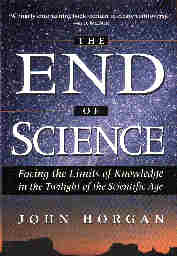Lucky for us Horgan was not seeking his Self during the research for this book, but was
seeking the selves of such famous scientists as Thomas Kuhn, Karl Popper, John Wheeler, Richard
Dawkins, Stephen Jay Gould, Noam Chomsky, Francis Crick, Gerald Edelman, Stuart Kaufmann,
Roger Penrose, Marvin Minsky, Murray Gell-Mann, and Freeman Dyson, to list some of the better
known of the forty plus interviews he did. Some of them were interviewed within a year or two of
their death, not surprising considering the advanced age of many of these patriarchs of science.
In each interview he posed this question in one form or another, "If the quest for knowledge
ended, what would become of us? What would give our existence meaning?" The presupposition
of his question is that science is a cul-de-sac, a dead-end street, so what shall we do when we reach
the end of the street? If anyone suggested that science is not the only street, that there are freeways
nearby, he was promptly dispatched by Horgan with the cute label of ironic scientist. That epithet is
enough to cast the interviewee upon the dung heap of literary writers, whose work is not real science.
I felt throughout the book that the more sharply Horgan defined the real scientist, the
empirical scientist, the more desolate a picture he painted of the future of such heroic figures. When
someone offers me the forced choice of dung heap or desolation, I suspect he's wearing industrial-strength, Latin-thinking blinders.
The wonderful insights of the few etheric-thinkers he interviewed didn't faze Horgan a bit.
Karl Popper talked about the calving of icebergs of meaning off the mainland of sensible and
supersensible reality thus:
[page 36] A scientific theory, Popper insisted, is an invention, an
act of creation as profoundly mysterious as anything in the arts.
How did Popper fare in Horgan's view? He was painted as contradicting himself in several
areas of his teachings, and in the revealing last sentence of the section on Popper, Horgan says,
"Popper was coming close to blaming the Jews for the Holocaust." Etheric-thinkers are accused of
"insisting" whereas the good Latin-thinkers merely say things. They suggest bad things and the real
scientists suggest good things. Horgan may have been in search of other selves, but could only write
of his Self once the interviews were over.
Horgan's large Self, appearing on every page, is merely subtext to the main show, in which
the great scientific minds of the 20th Century are allowed to "strut and fret their hour upon the stage"
for the audience consisting of Horgan and his readers. Some strutted, some fretted, and it all made
for a great show. If you've read many of the books of these great minds, you might imagine, as I did
when Gould and Kaufmann challenged the views of Dawkins, that their books on my library shelves
were talking to each other. Not only does Horgan give us his word pictures of the interviewees,
warts and all, but he gives us their not always complimentary descriptions of each other. All of which
serves to spice up the book and pull the reader through to the last page.
The book ends with Horgan's description of his own God-realization, one that curiously ends
in his realization of the terror of God, "God's fear of his own Godhood, and of his potential death."
A terror that Horgan claims is "the secret of existence."
He ends the book with these words:
[page 226] Our plight is God's plight. And now that science — true, pure,
empirical science — has ended, what else is there to believe in?
Horgan has set up the "what else to believe in" as straw men and systematically demolished
them, and now, walking on the empty stage, wonders why he is so alone.
This writer would like to suggest an epitaph for the tombstone of true, pure, empirical
science:
Here Lies
Latin-thinking Science
Perished on a
Melting Iceberg
Off the Mainland.
~^~
Any questions about this review, Contact: Bobby Matherne
~~~~~~~~~~~~~~~~~~~~~~~~~~~~~~~~~~~~~~~~~~~~~~~~~~~~~~~~~~







